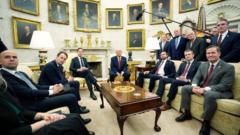The recent leak of a military chat group involving prominent Trump administration officials has exposed internal debates over a U.S. strike against Houthi forces in Yemen and criticisms regarding European defense spending. The conversation highlighted contrasting views on the strike's implications for Europe and the U.S. stance on foreign aid, particularly concerning oil prices and national security messaging.
Revelations from Leaked Military Chat Highlight U.S. Tensions with Europe

Revelations from Leaked Military Chat Highlight U.S. Tensions with Europe
A leaked chat involving top U.S. military officials and a journalist reveals debates over military actions in Yemen and concerns about European defense funding.
Washington D.C. is reeling from a significant security breach following the revelation of a group chat that included high-ranking figures in the Trump administration, such as Vice-President JD Vance, Defence Secretary Pete Hegseth, and National Security Adviser Mike Waltz. The leaked conversation, shared by journalist Jeffrey Goldberg of The Atlantic, detailed discussions surrounding imminent military action against Iran-backed Houthi forces in Yemen. Goldberg claimed to have viewed classified military details, including targets and timing, just hours before the strikes occurred.
Key takeaways from the chat have surfaced, revealing the nuanced positions held by participants concerning U.S. military engagement in Yemen. Vice-President Vance expressed concerns that the proposed military action primarily served European interests rather than those of the United States, remarking that an attack on the Houthis could inflate oil prices and undermine Trump's broader stance on European defense accountability.
The dialogue included Vance's frustration towards the prospect of "bailing Europe out again," a sentiment echoed by Defence Secretary Hegseth, who labeled European dependence on U.S. military support as "PATHETIC." A group member identified as "SM" suggested that any U.S. military success should be leveraged to extract economic concessions from Egypt and Europe post-strike.
The group chat also illustrated an unconventional dynamic, with emojis and prayers exchanged among members, including Vance's message for victory and expressions of support from other officials post-strike. Amidst the tension surrounding the military action, the conversation also reflected attempts to distance accountability from Trump, with members discussing how to frame narratives that would deflect blame towards President Biden.
Since the leak, there have been increasing calls from Democratic lawmakers for an inquiry into the matter as concerns grow regarding national security implications. In a recent statement regarding the incident, Trump denied having prior knowledge but reiterated his support for Waltz. Meanwhile, Hegseth defended the group’s actions, asserting that "Nobody was texting war plans."
This incident not only raises questions about internal communication protocols within high-level military discussions but also highlights the ongoing complexities characterizing U.S. foreign policy, particularly concerning its allies and adversaries.






















